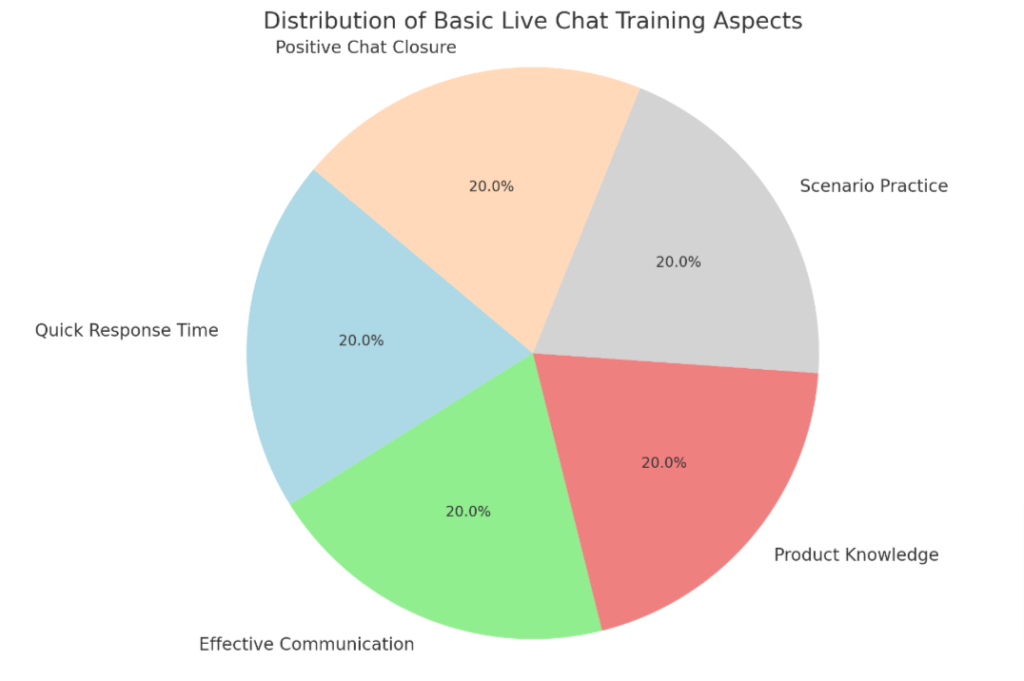Laying the Groundwork: Essential Basics of Live Chat Training
Struggling to keep customers happy in live chats? A staggering 42% of consumers expect a response within an hour on live chat. This post will guide you through the basics of training your team to deliver that speedy, top-notch service.
Keep reading and let’s chat success!
Key Takeaways
- Quick response times in live chat support are essential, with customers expecting responses within seconds to minutes. Training should focus on agents being swift and efficient.
- A friendly greeting and understanding the customer’s issue quickly lead to more effective assistance; training must include good communication skills and problem-solving techniques.
- Live chat training involves thorough product knowledge, allowing agents to provide accurate information and solutions that resolve customer queries confidently.
- Regular scenario practice is recommended for live chat teams to handle a range of issues effectively, from technical troubles to dealing with an upset customer calmly.
- Ending a chat positively by thanking the customer and inviting feedback can leave a lasting good impression, contributing to high satisfaction levels.
The Importance of Live Chat Training
Live chat training equips customer service agents with vital skills to handle real-time conversations effectively. It ensures that every team member understands the ins and outs of the live chat software, which is essential for providing a smooth and efficient customer experience.
Training helps agents develop strong interpersonal communication abilities, crucial for resolving conflicts and addressing customer issues promptly.
Agents become more adept at offering quick solutions and accurate information when they’re well-trained in live chat support. This proficiency boosts customer satisfaction rates as it shows customers that the business values their time and needs.
A comprehensive training process also covers off-hours support, preparing agents to deliver high-quality service anytime customers reach out. Ongoing training keeps these skills sharp, enabling your team to evolve with new technologies and strategies for perfect customer experiences.
Best Practices for Live Chat Support
Ensure quick response time, proper greeting and identification, effective communication and problem-solving, offering solutions and resources, and ending the chat on a positive note.
These practices are essential for providing top-notch customer service through live chat support.
Quick response time
Quick response time is a cornerstone of effective live chat support. Customers expect instant attention when they reach out via live chat, and any delay can quickly lead to frustration and dissatisfaction.
Live chat training must emphasize the importance of responding swiftly to customer issues, ideally within seconds. Agents should be equipped with the right tools and knowledge that allow them to manage multiple chats efficiently without compromising on quality.
Handling chats promptly demonstrates respect for customers’ time and sets the stage for a perfect customer experience. It’s crucial that agents understand how their fast reactions contribute significantly to customer satisfaction and overall success in building trust online.
With practice and ongoing training focused on speed, representatives will improve not just in quickness but also in their ability to offer solutions confidently during off-hours support or peak times.

Proper greeting and identification
Kicking off a live chat with the right tone sets the stage for a productive conversation. Trained agents should start by introducing themselves using their name and asking for the customer’s name in return.
This personal touch can make customers feel valued and more comfortable sharing their concerns.
Identifying the purpose of the customer’s contact right away helps in providing targeted assistance. Agents must confirm what issue or question has prompted the chat to ensure they understand and can address it effectively.
Clear identification leads to more efficient problem resolution and contributes to a smoother customer service experience overall.
Effective communication and problem-solving
Effective communication is crucial in live chat support. It involves active listening and clear, concise responses to customers’ queries. Problem-solving skills are equally important – agents should be able to understand the issue, propose a solution, and follow through until resolution.
Utilizing positive language and offering alternative solutions can help diffuse tense situations.
Solid communication and strong problem-solving skills lay the foundation for exceptional live chat support experiences. Agents who excel in these areas are better equipped to meet customer needs promptly while maintaining a high level of satisfaction.
Offering solutions and resources
When handling live chat support, it’s crucial to offer practical solutions and valuable resources to address customer issues effectively. By actively listening and understanding the problem at hand, you can provide tailored solutions and share relevant resources that empower customers to resolve their concerns.
Equipping your team with comprehensive knowledge of products and services will enable them to offer accurate information and helpful resources, enhancing the overall customer experience.
Empowering your live chat support team with a robust database of frequently asked questions, troubleshooting guides, and product demos can streamline the process of offering solutions and resources during customer interactions.
Ending the chat on a positive note
Ensure to end every chat on a positive note by expressing gratitude and allowing the customer to provide feedback. Thank them for choosing your company’s live chat support, and invite them to share their thoughts about the service.
This not only shows appreciation but also provides an opportunity for improvement based on their experience. Offering a personalized well-wish or expressing hope for a resolution can leave customers with a positive impression.
To ensure every conversation ends positively, emphasize the importance of leaving no question unanswered. Encourage representatives to ask if there is anything else they can assist with before closing the chat.
Creating a Successful Live Chat Training Plan
Effective live chat training plans involve smooth onboarding, encouraging ownership and confidence, learning about products and services, practicing with different scenarios, and emphasizing the importance of calmness.
Smooth onboarding
New employees need a smooth onboarding process to get them ready for live chat support. Here’s how it’s done:
- Introduce them to the live chat software and familiarize them with its features and functions.
- Provide training on navigating through common customer issues and utilizing resources for quick problem-solving.
- Teach the importance of maintaining a professional tone and attitude during interactions with customers.
- Assign mentors or coaches to guide new employees through real – time chat scenarios, offering constructive feedback.
- Encourage new team members to ask questions and seek clarification whenever needed, promoting open communication.
- Emphasize the significance of active listening and empathy to better understand and address customer inquiries.
- Offer ongoing support and resources as they continue to gain confidence in their role.
Encouraging ownership and confidence
Employees are encouraged to take ownership of their interactions and exercise confidence in resolving customer issues. This can be achieved through ongoing training, open communication, and empowering employees to make decisions within the scope of their responsibilities.
By providing them with the necessary tools and resources, they can confidently handle various customer service scenarios.
This approach fosters a sense of accountability and helps employees feel more invested in delivering exceptional customer support. As a result, customers will experience consistent and reliable service from knowledgeable representatives who exude confidence in their abilities.
Building this level of ownership and confidence requires continuous support from management as well as regular feedback sessions to ensure that employees feel valued and capable in their roles.
Learning about products and services
Encouraging ownership and confidence ensures that live chat executives are equipped to represent the company effectively. Learning about products and services further solidifies their knowledge base. This includes:
- Understanding the range of products offered, including their features and benefits.
- Familiarizing themselves with the services provided, so they can confidently address customer queries.
- Gaining insight into any unique selling points or competitive advantages.
- Knowing how to access and navigate resources such as knowledge bases or product databases.
- Staying updated on new product launches and updates through training materials and internal communication channels.
Practicing with different scenarios
To ensure readiness for any customer situation, employees should practice with different scenarios:
- Handling a dissatisfied customer who received a faulty product: This involves active listening, empathy, and offering solutions using the relevant knowledge of products and services.
- Dealing with a technical issue reported by a customer: This includes troubleshooting skills, patience, and the ability to communicate technical information in a clear and understandable manner.
- Managing multiple chat sessions simultaneously: Practicing time management, prioritization, and adaptability to handle various customer needs effectively.
- Addressing language barriers when assisting international customers: Developing cultural awareness, utilizing translation tools if available, and ensuring clear communication despite language differences.
- Resolving conflicts between customers in a group chat setting: Demonstrating conflict resolution skills, maintaining professionalism, and guiding the conversation towards a positive outcome.
- Providing emotional support to a distressed customer: Practicing active listening, expressing empathy, and offering personalized assistance to alleviate the customer’s concerns.
Emphasizing the importance of calmness
As part of creating a successful live chat training plan, emphasizing the importance of calmness plays a crucial role in shaping effective communication and problem-solving skills.
By maintaining a composed demeanor during interactions with customers, chat executives can help diffuse tense situations and instill confidence in customers that their concerns are being addressed with care.
Encouraging a calm approach also helps in building trust and rapport with customers, leading to enhanced customer satisfaction and loyalty. It allows chat support representatives to maintain clarity of thought, demonstrate empathy effectively, and convey solutions cohesively, contributing to an overall positive customer experience.
Conclusion
In conclusion, mastering live chat training is crucial for exceptional customer support. The best practices and a well-planned training program can empower your team to handle customer issues effectively.
With ongoing learning and emphasis on communication skills, businesses can ensure a seamless and positive chat customer experience. So, invest in the right training techniques and see the impact of strong foundational live chat training on overall customer satisfaction and retention rates!

